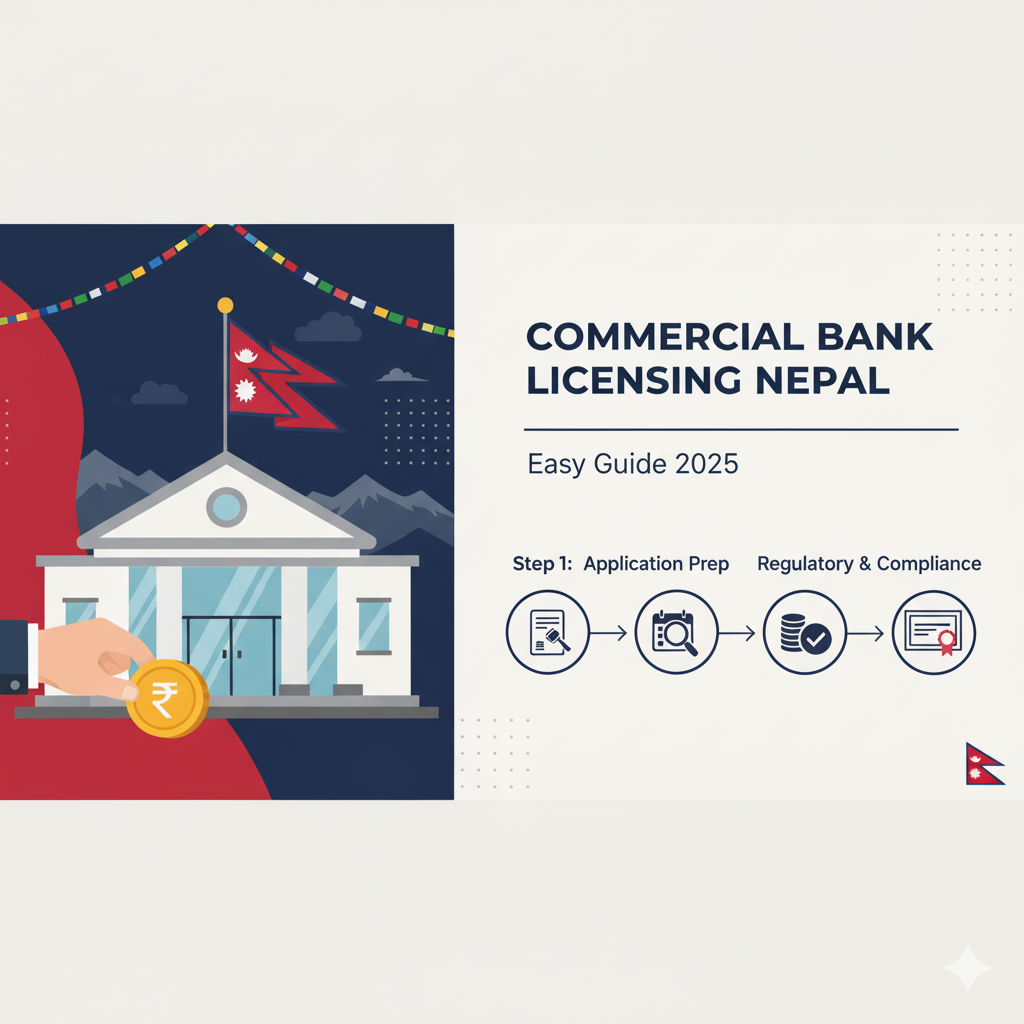Table of Contents
Understanding Commercial Bank Licensing Requirements in Nepal
Commercial bank licensing Nepal is a complex regulatory process governed by the Nepal Rastra Bank (NRB), the central bank of Nepal. Establishing a commercial bank in Nepal requires strict compliance with the Banking and Financial Institutions Act (BAFIA) and meeting stringent NRB banking regulations designed to ensure financial stability and consumer protection.
The commercial bank setup Nepal process involves multiple stages, from initial application to final approval, with each stage requiring meticulous documentation and adherence to regulatory standards. This comprehensive guide will walk you through every aspect of obtaining a banking license application Nepal.
What is a Commercial Bank License?
A commercial bank license Nepal is an official authorization granted by the Nepal Rastra Bank that permits an entity to conduct commercial banking operations within the country. This license is governed by the Banking and Financial Institutions Act, 2073 (2016) and subsequent amendments, which outline the legal framework for all banking institutions operating in Nepal.
The NRB banking license serves as both a regulatory requirement and a mark of credibility, ensuring that only qualified institutions with adequate capital, management expertise, and operational systems can enter Nepal’s banking sector.
Legal Framework Governing Commercial Bank Licensing in Nepal
Primary Legislation and Regulations
The commercial bank licensing Nepal process is primarily governed by:
- Banking and Financial Institutions Act, 2073 (2016) – The cornerstone legislation regulating all banking institutions in Nepal
- Nepal Rastra Bank Act, 2058 (2002) – Establishes NRB’s authority to regulate and supervise banks
- Company Act, 2063 (2006) – Governs the corporate structure of banking institutions
- NRB Directives and Circulars – Specific regulatory requirements updated periodically
Recent Regulatory Developments
Recent Nepal banking license requirements have been influenced by:
- Enhanced capital adequacy requirements following international Basel III standards
- Strengthened corporate governance norms
- Increased focus on digital banking and cybersecurity regulations
- Updated anti-money laundering (AML) and know-your-customer (KYC) requirements
Who Can Apply for a Commercial Bank License in Nepal?
Eligibility Criteria for Applicants
The commercial bank licensing Nepal process has strict eligibility requirements:
- Promoter Requirements: Must be a company registered under Nepal’s Company Act
- Capital Requirements: Minimum paid-up capital as specified by NRB (currently NPR 8 arba for commercial banks)
- Management Expertise: Demonstrated banking experience and professional qualifications
- Fit and Proper Test: All directors and key management personnel must pass NRB’s fit and proper assessment
- Business Plan: Comprehensive business plan demonstrating viability and compliance capability
Manpower company registration in Nepal
Foreign Investment Considerations
Foreign investors seeking banking license application Nepal must comply with:
- Nepal’s foreign investment policies
- Sectoral caps on foreign ownership
- Technology transfer requirements
- Additional regulatory approvals from the Department of Industry
What Are the Capital Requirements for Commercial Bank Licensing?
Minimum Capital Structure
The NRB banking regulations specify detailed capital requirements:
| Requirement Type | Amount (NPR) | Description |
|---|---|---|
| Minimum Paid-up Capital | 8,000,000,000 | For new commercial banks |
| Capital Adequacy Ratio | 11% | Minimum CAR requirement |
| Core Capital | 70% | Of total regulatory capital |
| Additional Capital Buffer | 2.5% | For systemically important banks |
Capital Sourcing and Verification
Commercial bank setup Nepal requires transparent capital sourcing:
- Capital must be sourced from legitimate channels
- Promoters must provide source of funds documentation
- Capital verification by NRB-appointed auditors
- Compliance with anti-money laundering regulations
When Should You Apply for a Commercial Bank License?
Optimal Timing Considerations
The commercial bank licensing Nepal process timing depends on:
- Market Conditions: Economic stability and growth prospects
- Regulatory Environment: Current NRB policies and priorities
- Capital Availability: Ability to meet minimum capital requirements
- Management Readiness: Availability of qualified banking professionals
- Technology Infrastructure: Preparedness for digital banking requirements
Application Timeline
The banking license application Nepal process typically takes 12-18 months:
| Phase | Duration | Key Activities |
|---|---|---|
| Pre-application Preparation | 3-6 months | Business plan, capital arrangement, team formation |
| Formal Application Submission | 1-2 months | Document preparation and submission |
| NRB Review and Assessment | 6-9 months | Due diligence, site visits, management interviews |
| Final Approval and Licensing | 1-2 months | License issuance and operational clearance |
Where to Submit Commercial Bank License Applications?
Official Application Channels
Commercial bank licensing Nepal applications must be submitted to:
- Nepal Rastra Bank (Banking Regulation Department)
- Department of Industry (for foreign investment approval)
- Securities Board of Nepal (for public offering requirements)
Required Documentation
Complete NRB banking license applications require:
- Application Form: Prescribed NRB application form
- Business Plan: Detailed 5-year business plan with financial projections
- Promoter Information: Background and financial status of all promoters
- Management Profiles: CVs and qualifications of proposed management team
- Capital Evidence: Proof of capital availability and sourcing
- Legal Documents: Certificate of incorporation, articles of association
- Compliance Framework: AML/CFT policies, risk management framework
How to Navigate the Commercial Bank Licensing Process?
Step-by-Step Application Process
The commercial bank licensing Nepal process follows these key steps:
- Pre-application Consultation: Initial discussion with NRB officials
- Business Plan Preparation: Comprehensive planning and documentation
- Capital Arrangement: Securing minimum capital requirements
- Management Team Formation: Recruiting qualified banking professionals
- Formal Application Submission: Complete application with all required documents
- NRB Due Diligence: Background checks and verification processes
- In-Person Interviews: Management team interviews with NRB officials
- Site Inspection: Physical verification of proposed premises
- Final Approval: License issuance upon successful completion
Common Challenges and Solutions
Banking license application Nepal applicants often face:
| Challenge | Solution |
|---|---|
| Complex Documentation | Engage professional consultants with banking regulatory experience |
| Capital Requirements | Secure investor commitments early in the process |
| Management Expertise | Recruit experienced banking professionals |
| Regulatory Changes | Maintain regular communication with NRB officials |
| Technology Requirements | Invest in robust banking technology infrastructure |
Why Choose Nepal for Commercial Banking Operations?
Market Opportunities
Nepal offers compelling opportunities for commercial bank licensing Nepal:
- Growing Economy: Consistent GDP growth of 6-7% annually
- Underbanked Population: Significant portion of population without formal banking access
- Digital Banking Growth: Rapid adoption of digital financial services
- Regional Integration: Opportunities in cross-border banking with India and China
Regulatory Advantages
The NRB banking regulations provide:
- Stable Regulatory Framework: Clear and consistent regulatory environment
- International Standards: Alignment with Basel III and international best practices
- Central Bank Support: NRB guidance and support for new entrants
- Progressive Policies: Encouragement of financial innovation and inclusion
Commercial Bank Licensing Requirements Table
| Requirement Category | Specific Requirement | Details |
|---|---|---|
| Legal Status | Company Registration | Must be registered under Company Act, 2063 |
| Capital Requirements | Minimum Paid-up Capital | NPR 8,000,000,000 |
| Capital Structure | Promoters’ Contribution | Minimum 30% from promoters |
| Management | Chief Executive Officer | Minimum 10 years banking experience |
| Management | Board of Directors | Minimum 7 directors with banking/financial expertise |
| Physical Infrastructure | Head Office | Must be established in Kathmandu Valley initially |
| Technology | Core Banking System | Must have robust, NRB-compliant banking software |
| Compliance | AML/CFT Framework | Comprehensive anti-money laundering systems |
Commercial Bank Licensing Fees Structure
| Fee Type | Amount (NPR) | Payment Stage |
|---|---|---|
| Application Processing Fee | 500,000 | At application submission |
| Due Diligence Fee | 1,000,000 | During NRB review process |
| License Issuance Fee | 5,000,000 | Upon license approval |
| Annual Supervision Fee | 0.05% of total assets | Annually based on audited financials |
| Branch License Fee | 100,000 per branch | For each additional branch |
Frequently Asked Questions About Commercial Bank Licensing in Nepal
What is the minimum capital required for commercial bank licensing in Nepal?
The minimum capital requirement for commercial bank licensing Nepal is NPR 8,000,000,000 (8 arba) as per current NRB banking regulations. This capital must be fully paid-up and sourced from legitimate channels.
How long does the commercial bank licensing process take in Nepal?
The commercial bank licensing Nepal process typically takes 12-18 months from initial application to final approval. This timeline includes pre-application preparation, NRB review, due diligence, and final licensing stages.
Can foreign investors obtain commercial bank licenses in Nepal?
Yes, foreign investment in commercial bank licensing Nepal is permitted subject to Nepal’s foreign investment policies. Foreign investors must comply with sectoral ownership caps and obtain additional approvals from the Department of Industry.
What are the key management requirements for commercial bank licensing?
Management requirements for commercial bank licensing Nepal include a CEO with minimum 10 years banking experience, a board of directors with financial expertise, and key management personnel who pass NRB’s fit and proper test.
What documents are required for commercial bank license application in Nepal?
Required documents for banking license application Nepal include application forms, business plans, promoter information, management profiles, capital evidence, legal documents, and compliance frameworks as specified by NRB banking regulations.
What are the ongoing compliance requirements after obtaining a commercial bank license?
Post-licensing compliance requirements for commercial banks Nepal include maintaining capital adequacy ratios, submitting regular reports to NRB, adhering to lending guidelines, implementing AML/CFT measures, and undergoing regular NRB inspections.
Can a licensed commercial bank in Nepal operate internationally?
International operations for commercial banks Nepal require specific approvals from NRB and the concerned regulatory authorities in target countries. Banks must demonstrate adequate risk management capabilities and capital strength.
What are the common reasons for commercial bank license application rejection in Nepal?
Common rejection reasons for commercial bank licensing Nepal include inadequate capital, insufficient management expertise, incomplete documentation, failure to meet fit and proper requirements, and non-compliance with NRB banking regulations.
Take the Next Step Toward Commercial Bank Licensing in Nepal
Commercial bank licensing Nepal represents a significant opportunity for qualified investors and banking professionals looking to enter Nepal’s growing financial sector. With proper preparation, adequate capital, and expert guidance, obtaining a banking license application Nepal is achievable despite the complex regulatory requirements.
Success in the commercial bank licensing Nepal process requires:
- Thorough understanding of NRB banking regulations
- Adequate capital preparation and documentation
- Experienced management team with banking expertise
- Professional legal and regulatory consulting support
- Patience and persistence throughout the application process
Call to Action: Ready to begin your commercial bank licensing Nepal journey? Contact Nepal Rastra Bank’s Banking Regulation Department for official application forms and current requirements. For expert guidance through the complex licensing process, consider engaging professional consultants with specific experience in Nepal’s banking sector. Stay updated with the latest NRB banking regulations by regularly checking the official Nepal Rastra Bank website and attending industry consultations.
Remember that commercial bank licensing Nepal requirements may change, so always verify current regulations with NRB before proceeding with your application. The effort invested in proper preparation and compliance will pay off in establishing a successful commercial banking operation in Nepal’s dynamic financial market.
Note: This guide provides comprehensive information about commercial bank licensing in Nepal based on available regulatory frameworks. However, banking regulations are subject to change, and applicants should always consult with Nepal Rastra Bank for the most current requirements and procedures before proceeding with any license application.
Corporate Biz legal and Company Darta Nepal is the best and most credible company registration in Nepal and expert Law firm in Nepal




